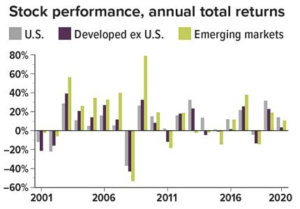For the past decade, U.S. stocks have outperformed foreign stocks by a wide margin, due in large part to the stronger U.S. recovery after the Great Recession. In general, U.S. companies have been more nimble and innovative in response to changing business dynamics, while aging populations in Japan and many European countries have slowed economic growth.1
Despite these challenges, some analysts believe that foreign stocks may be poised for a comeback as other countries recover more quickly from the effects of COVID-19 than the United States. On a more fundamental level, the lower valuations of foreign stocks could make them a potential bargain compared with the extremely high valuations of U.S. stocks.2–3
Global Growth and Diversification
Investing globally provides access to growth opportunities outside the United States, while also helping to diversify your portfolio. Domestic stocks and foreign stocks tend to perform differently from year to year as well as over longer periods of time (see chart). Although some active investors may shift assets between domestic and foreign stocks based on near- or mid-term strategies, the wisest approach for most investors is to determine an appropriate international stock allocation for a long-term strategy.
A World of Choices
The most convenient way to participate in global markets is by investing in mutual funds or exchange-traded funds (ETFs) — and there are plenty of choices available. In Q1 2021, there were more than 1,400 mutual funds and 600 ETFs focused on global equities.4
International funds range from broad, global funds that attempt to capture worldwide economic activity to regional funds and those that focus on a single country. Some funds are limited to developed nations, whereas others may focus on nations with emerging economies.
The term “ex U.S.” or “ex US” typically means that the fund does not include domestic stocks. On the other hand, “global” or “world” funds may include a mix of U.S. and international stocks, with some offering a fairly equal balance between the two. These funds offer built-in diversification and may be appropriate for investors who want some exposure to foreign markets balanced by U.S. stocks. For any international stock fund, it’s important to understand the mix of countries represented by the securities in the fund.
Additional Risks and Volatility
All investments are subject to market volatility, risk, and loss of principal. However, investing internationally carries additional risks such as differences in financial reporting, currency exchange risk, and economic and political risk unique to a specific country. Emerging economies might offer greater growth potential than advanced economies, but the stocks of companies located in emerging markets could be substantially more volatile, risky, and less liquid than the stocks of companies located in more developed foreign markets.
Domestic vs. Foreign
Over the past 20 years, stocks in emerging markets have outperformed U.S. stocks but have been much more volatile. Stocks of developed economies outside the United States have yielded less than domestic stocks over the 20-year period but have outperformed in nine of those 20 years.

Source: Refinitiv, 2021, for the period 12/31/2000 to 12/31/2020. U.S. stocks are represented by the S&P 500 Composite Total Return Index, developed ex US stocks are represented by the MSCI EAFE GTR Index, and emerging market stocks are represented by the MSCI EM GTR Index; all are considered representative of their asset classes. The performance of an unmanaged index is not indicative of the performance of any specific investment. Individuals cannot invest directly in an index. Rates of return will vary over time, especially for long-term investments. Past performance is not a guarantee of future results. Actual results will vary.
Diversification is a method to help manage risk; it does not guarantee a profit or protect against loss. The return and principal value of all stocks, mutual funds, and ETFs fluctuate with changes in market conditions. Shares, when sold, may be worth more or less than their original cost. Supply and demand for ETF shares may cause them to trade at a premium or a discount relative to the value of the underlying shares.
Mutual funds and ETFs are sold by prospectus. Please consider the investment objectives, risks, charges, and expenses carefully before investing. The prospectus, which contains this and other information about the investment company, can be obtained from your financial professional. Be sure to read the prospectus carefully before deciding whether to invest.
1, 2) U.S. News & World Report, October 1, 2020
3) CNBC, January 23, 2021
4) Investment Company Institute, 2021
Copyright 2006- Broadridge Investor Communication Solutions, Inc. All rights reserved.
Broadridge Investor Communication Solutions, Inc. does not provide investment, tax, or legal advice. The information presented here is not specific to any individual’s personal circumstances.
To the extent that this material concerns tax matters, it is not intended or written to be used, and cannot be used, by a taxpayer for the purpose of avoiding penalties that may be imposed by law. Each taxpayer should seek independent advice from a tax professional based on his or her individual circumstances.
These materials are provided for general information and educational purposes based upon publicly available information from sources believed to be reliable—we cannot assure the accuracy or completeness of these materials. The information in these materials may change at any time and without notice.
*Non-deposit investment products and services are offered through CUSO Financial Services, L.P. (“CFS”), a registered broker-dealer (Member FINRA / SIPC) and SEC Registered Investment Advisor. Products offered through CFS: are not NCUA/NCUSIF or otherwise federally insured, are not guarantees or obligations of the credit union, and may involve investment risk including possible loss of principal. Investment Representatives are registered through CFS. Coastal Federal Credit Union has contracted with CFS to make non-deposit investment products and services available to credit union members.
CFS representatives do not provide tax or legal guidance. For such guidance please consult with a qualified professional. Information shown is for general illustration purposes and does not predict or depict the performance of any investment or strategy. Past performance does not guarantee future results.
Trust Services are available through MEMBERS Trust Company. CFS* is not affiliated with Members Trust Company.






